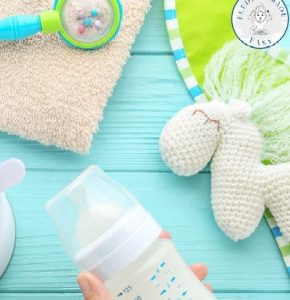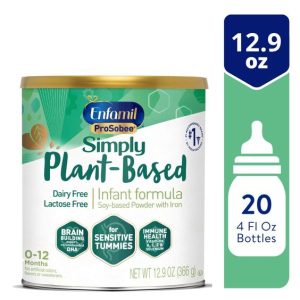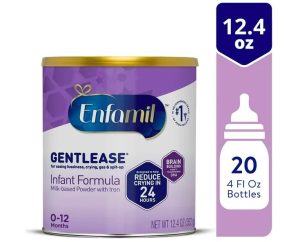Congratulations on your new arrival! As you settle into parenthood, one of the many decisions you’ll face is how to feed your baby. Choosing an infant formula is not easy. Do you know how to choose it?Breastfeeding is the recommended source of nutrition for newborns and infants, but if you choose not to breastfeed or are unable to, infant formula provides a safe and healthy alternative. This article offers guidance on selecting the right infant formula for your baby’s needs.
Understanding Infant Formula
Infant formula is a cow’s milk-based or soy-based product that’s specially manufactured to meet the nutritional needs of infants. It’s regulated by the FDA to ensure safety and quality. Here are some key points to remember about infant formula:
Types of Formula:
Most infant formulas are cow’s milk-based, but soy-based formula is a suitable alternative for babies with lactose intolerance.
Iron-Fortified:
Virtually all infant formula sold in the United States is iron-fortified. Iron is critical for infant development, and formula helps ensure they get enough.
Stages:
Some formula brands offer stage-based varieties, but these are not necessary. Standard infant formula is suitable for most babies from birth to age 1.
When to Consider Infant Formula
Here are some situations where you might consider using infant formula:
- Not Breastfeeding: If you choose not to breastfeed or are unable to due to medical reasons, formula provides complete nutrition for your baby.
- Supplementing Breastfeeding: Some mothers choose to combine breastfeeding with formula feeding. This is called combination feeding.
- Medical Conditions: In rare cases, a pediatrician might recommend a specialized formula for babies with certain medical conditions.
Consulting Your Pediatrician
Your pediatrician is your best resource for choosing an infant formula. They can consider your baby’s individual needs and health history and recommend a suitable formula. Here are some questions to ask your pediatrician:
- Is breastmilk or formula right for me?
- What type of formula do you recommend for my baby?
- Are there any specific ingredients I should avoid?
- How much formula should I feed my baby?
Important Factors When Choosing Formula
Once you’ve spoken with your pediatrician, here are some factors to consider when choosing an infant formula:
- Safety and Quality: Always choose an infant formula from a reputable brand that meets FDA guidelines.
- Ingredients: Look for iron-fortified formula with essential vitamins and minerals.
- Cost: Formula costs can vary. There are generic and brand-name options available.
- Ease of Use: Consider factors like mixing instructions and whether you prefer powder or liquid formula.
Feeding Practices and Safety Tips
Here are some key things to remember when preparing and feeding formula to your baby:
- Always Wash Hands: Wash your hands thoroughly with soap and warm water before preparing formula.
- Sterilize Bottles and Nipples: Sterilize bottles and nipples according to manufacturer’s instructions, especially for newborns.
- Follow Mixing Instructions: Carefully follow the mixing instructions on the formula label. Do not dilute formula or add extra water.
- Throw Away Unused Formula: Discard any unused prepared formula after feeding time.
Choosing an infant formula can feel overwhelming, but with guidance from your pediatrician and this information, you can feel confident selecting the right formula to meet your baby’s needs. Remember, the most important thing is to provide your baby with the proper nutrition for healthy growth and development.
Additional Considerations for Choosing Infant Formula
Once you’ve spoken with your pediatrician and considered the factors mentioned earlier, here are some additional things to keep in mind:
-
Special Dietary Needs: If your baby has a diagnosed medical condition or allergy, there might be a specific type of formula recommended by your pediatrician. These formulas are typically referred to as “metabolic” or “amino acid-based” formulas.
-
Organic Formula: Organic infant formula is available, but there’s no scientific evidence to suggest it offers significant health benefits compared to standard formula.
-
Store Brand vs. Name Brand: There’s no difference in quality or safety between store-brand and name-brand formulas as long as both meet FDA guidelines. Store-brand formulas can be a more budget-friendly option.
-
Samples: Some pediatricians offices or formula companies might offer samples to help you try different formulas before committing to a full-size container.
Feeding Habits and Comfort
-
Feeding Cues: Pay attention to your baby’s hunger cues, such as rooting, fussiness, or mouthing their hands. Don’t force your baby to finish a bottle and avoid using formula as a pacifier.
-
Pacifiers: Pacifiers can be a soothing tool for babies, and using one can help establish a feeding routine.
-
Spit-Up: Spit-up is common in babies and doesn’t necessarily indicate a problem. Consult your pediatrician if you have concerns about frequent or excessive spit-up.
-
Burping: Burp your baby throughout the feeding and after they finish a bottle to help release trapped air and prevent gas discomfort.
The Importance of a Healthy Diet for Mom
If you’re breastfeeding, remember that a healthy diet is important for both you and your baby. Eating a balanced diet rich in fruits, vegetables, and whole grains ensures you’re getting the nutrients your baby needs.
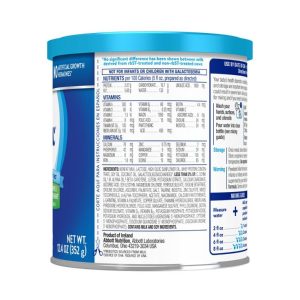
Building a Feeding Routine for Your Baby
Choosing an infant formula is just one part of establishing a feeding routine for your baby. Here are some additional tips:
-
Responsive Feeding: Pay attention to your baby’s hunger cues, such as rooting, fussiness, or mouthing their hands. Feed your baby when they show signs of hunger and stop when they seem satisfied.
-
Pacifiers: Pacifiers can be a soothing tool for babies, and using one can help establish a feeding routine.
-
Burping: Burp your baby throughout the feeding and after they finish a bottle to help release trapped air and prevent gas discomfort.
-
Schedule Consistency: Newborns generally eat every 2-3 hours, and gradually establish a more regular feeding schedule over time. Consistency can help your baby feel secure and regulate their sleep patterns.
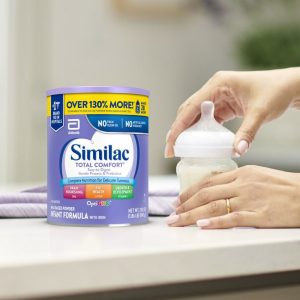
Conclusion
Choosing an infant formula can feel like a big decision, but with guidance from your pediatrician and this information, you can feel confident selecting the right formula to nourish your baby. Remember, the most important thing is to provide your infant with the proper nutrition they need to thrive.

